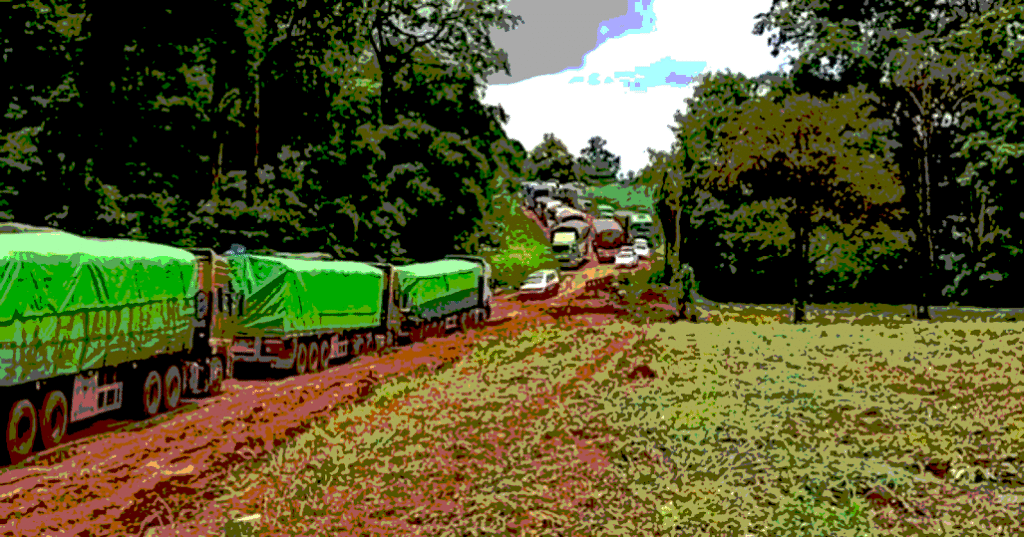Myanmar Spring Chronicle – August 13 Perspective
MoeMaKa, August 14, 2025
Commodity Prices Under the Shadow of Black Market Days, Blockades, Taxes, and Extortion
Many middle-aged people will remember the black market era that lasted from the 1970s up until around 1989, after the 8888 Uprising. During that time, consumer goods from neighboring and regional countries had to be smuggled into Myanmar, since official trade was largely blocked. Before the uprising, goods from Thailand, Malaysia, and Singapore were classified as contraband. Border towns such as Myawaddy, Tachileik, and Kawthaung served as gateways for goods that crossed into Myanmar unofficially, bypassing customs. These goods were then transported to larger cities using various methods.
Likewise, coastal towns in Mon State and Tanintharyi Region smuggled goods from Penang and Singapore by boat to ports like Mawlamyine, Ye, and Myeik, and then further inland to Yangon and Mandalay. These goods were subject to confiscation, and those involved were sometimes even imprisoned under customs laws.
This era of black market trade effectively ended after the 1988 military coup, when the economy began to shift toward a market-based system.
However, following the 2021 military coup, the regime has been increasingly tightening restrictions on border trade. Just recently, under new directives from the junta’s Foreign Exchange Supervisory Committee, a wide range of goods — including incense, sugar cubes, coconut milk, canned milk, yogurt, motorcycles, bicycle tires, plastic buckets, and SCG cement — have been banned from import. Others are allowed only via sea transport.
Reports from Yangon mention soaring prices for basic goods such as cooking oil, toothpaste, detergent, and even medicine. Shortages and unaffordability are becoming more common.
At the same time, the junta’s unofficial Anti-Illegal Trade Committee, chaired by its deputy leader, has been cracking down on goods transported via border routes, classifying many as untaxed contraband. These actions have further disrupted trade.
Over the past 3–4 years, fighting across Myanmar has blocked many roads, effectively closing off inter-city commerce. For example, the Asia Highway connecting Myawaddy and Hpa-an has been closed for nearly two years due to conflict and territory control issues.
In northern Shan State, critical roads linking Mandalay to the China border — through Pyin Oo Lwin, Lashio, and Muse — have been partially destroyed or closed for almost two years. Similarly, the road between Mandalay and Myitkyina has sections closed for months or years at a time.
Traders report that what used to take one day now takes three. Goods must pass through multiple checkpoints controlled by various armed groups, all demanding taxes or bribes, pushing commodity prices to unaffordable levels.
In cities like Yangon, prices are relatively moderate. But in conflict-affected or remote towns, prices for fuel, rice, food, and medicine — transported from urban centers — have become extraordinarily high.
Rakhine State is suffering more than anywhere else. Since fighting with the Arakan Army resumed in November 2023, the junta has imposed a blockade on the entire state, only allowing limited supply routes to its strongholds in Sittwe. This has forced people in Rakhine to rely on smuggled goods from Thailand and Bangladesh, often at exorbitant prices.
This economic strangulation amounts to a war crime. Recently, there was even a report that some senior junta officers involved in taking bribes from traders were arrested and given heavy prison sentences.
Rakhine people are not only paying inflated prices but also facing shortages of fuel for farming, being forced to farm manually. Even when they can grow crops, they cannot find markets to sell their rice.
Rakhine State has been under these dire conditions for nearly two years. People have to pay outrageous prices for basic necessities, even as livelihoods vanish.
Although the Arakan Army has militarily seized much of Rakhine, the junta’s blockade remains in full force since November 2023.
Additionally, many people from conflict areas have fled to bigger cities over the past two years. Those with resources have relocated to Yangon, Mandalay, or Taunggyi, but the majority remain displaced within their own regions.
This influx has driven up rent prices in safer cities. Displaced families are spending their last savings and income trying to protect themselves or keep their children from being conscripted.
One recent tragedy from Lashio highlights the economic desperation: a father poisoned himself and his three children with rat poison while the mother was away working. It is one of many heartbreaking cases being reported.
The longer the armed resistance drags on, the harder it becomes for civilians in these areas to simply survive.

